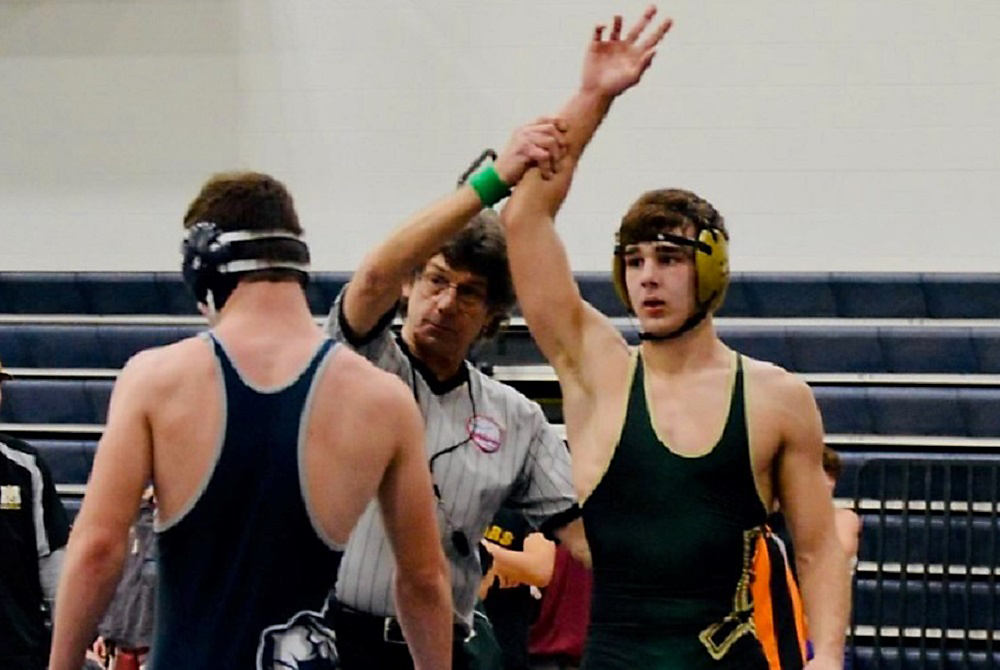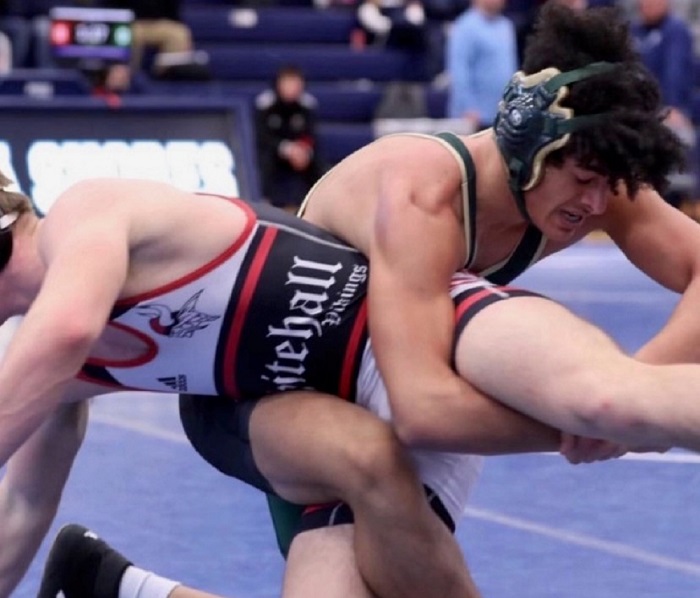
Wrestling’s Next Big Thing
August 13, 2013
“The next big thing” is what marketers often seek. But it’s what school sports administrators usually dread because the “next big thing” is routinely a problem.
And so it is with the sport of wrestling which, at the high school level, has had an admirable record of solving the big issues that have threatened the sport’s existence.
School-based wrestling addressed unhealthy practices for weight loss, first with rules about what could not be done – e.g., rubber suits were banned from practices – and then with rules about what must be done, including a weight management program.
Twenty years ago, MHSAA member schools became one of the early adopters of policies and procedures that include the training of skinfold assessors who are employed to do measurements of all wrestlers, from which each wrestler learns his/her lowest allowed weight and the rate at which he/she may descend to that weight and still remain eligible to compete. These rules, and a nutrition education program, saved interscholastic wrestling from much public criticism and, possibly, from continuing drops in participation.
In addition, the Wrestling Committee has been unique among MHSAA sport committees in recognizing that a season that is too long is neither healthy for nor desired by student-athletes; and the committee has reduced the length of season and number of matches. All of this, combined with the MHSAA team tournament, have greatly increased the sport’s popularity among both participants and spectators.
But in spite of all this, the sport of wrestling is “one communicable skin disease outbreak from extinction,” according to those discussing the state of high school wrestling at a national meeting in June. We’ve already seen an outbreak lead to the suspension of all interscholastic wrestling for two weeks in Minnesota during the 2006-07 school year.
To avoid this next big thing, the rule makers have banned taped headgear, because tape can’t be properly cleaned. The NFHS Sports Medicine Advisory Committee, which is the MHSAA’s advisory body as well, is urging schools to mandate that all participants shower or perform an antiseptic wipe-down after every match.
The MHSAA will make this issue a point of special emphasis in its online, print and face-to-face communications this fall. In addition, an excellent free webinar is provided by the National Wrestling Coaches Association. Click here for the webinar.

Finals Qualifiers Show Strength of Muskegon Catholic Central's Gains on Mat
By
Tom Kendra
Special for MHSAA.com
March 2, 2023
Muskegon Catholic Central is the smallest wrestling school in Muskegon County, with just 124 students in the high school.
 It also happens to be the only school in the county with two individual Regional champions in senior David Hill (157 pounds) and junior Easten Cook (165 pounds), who hope to add all-state honors to their resume when they compete at the MHSAA Individual Finals on Friday and Saturday at Ford Field in Detroit.
It also happens to be the only school in the county with two individual Regional champions in senior David Hill (157 pounds) and junior Easten Cook (165 pounds), who hope to add all-state honors to their resume when they compete at the MHSAA Individual Finals on Friday and Saturday at Ford Field in Detroit.
Now, don’t expect wrestling to usurp football as the sport of choice at MCC – which with 12 state titles during the playoff era is behind only now-closed Farmington Hills Harrison’s 13 championships – but throw in another Finals qualifier in senior Zach Michael (175) and the Crusaders grapplers boast three headed to Ford Field, not bad for a school which had only four wrestlers in the entire program in 2019.
“It’s been a great year for our program and our school, and we’re having a blast,” said fifth-year MCC coach Barry Kieft, who is assisted by PJ Mitchell.
“Those three state qualifiers are all stud football players. That sends a great message to the younger kids that wrestling will make you better on the football field.”
Hill was a star running back for the Crusaders’ Division 6 District finalist football team this fall, who had to get over a stigma to become a star on the mat.
“I used to be a germaphobe, so it’s hard to believe I even started wrestling,” said Hill, who is 32-7 this season and has 107 career wins. “But at some point, something changed. I love the independent part of it. You have to go out there and do it; you can’t blame anything on other people.”
 Hill, the son of former Muskegon Reeths-Puffer all-state running back DeMarkeo Hill, who led the Rockets to the Class A championship in 1992 and tragically died of brain cancer five years ago at the age of 44, calls his dad his athletic hero and his inspiration before every match.
Hill, the son of former Muskegon Reeths-Puffer all-state running back DeMarkeo Hill, who led the Rockets to the Class A championship in 1992 and tragically died of brain cancer five years ago at the age of 44, calls his dad his athletic hero and his inspiration before every match.
David Hill made short work of the field at 157 pounds at the Feb. 11 Division 4 Regional at Ithaca, including a pin at the 1:00 mark in the championship match.
This will be his second appearance at the Individual Finals, after placing fourth at Regionals last year. He believes his experience, speed and unorthodox style give him a shot at the title.
“I have a unique style, that’s for sure,” said Hill, a three-sport athlete who also runs track in the spring. “My coaches don’t know what to say to me because a lot of what I do isn’t conventional wrestling moves. So they just say, ‘Go out there and wrestle like David Hill.’”
Cook, meanwhile, is a conventional tactician at 165, the next weight class up from Hill.
Cook, a starting guard and linebacker on the football field, embraces the mental and physical challenges of wrestling.
“I think my biggest strength is my mental preparation and thinking things through,” said Cook, who got started in the sport in fifth grade when he was hanging around his older brother and now-MCC assistant coach, Aiden Cook. “I like the hardships that come with wrestling and seeing if you are strong enough to overcome it.”
Easten Cook, who as his name suggests, loves to experiment with different foods (right now, he and Hill eat a small granola bar dipped in honey before each match), won his Regional championship match 9-4.
 Cook sports his team’s best record at 37-7, with city, District and Regional titles. He has 82 career wins.
Cook sports his team’s best record at 37-7, with city, District and Regional titles. He has 82 career wins.
The third member of the Crusaders’ Finals trio is Michael, who has a 32-9 season record and 89 career wins.
In addition to the three qualifiers, MCC also had two wrestlers eclipse the 20-win plateau this season in juniors Andrew Rosema (138) and Sawyer Hanson (190).
That additional depth nearly pushed the Crusaders to a team District championship Feb. 8. MCC downed Holton, 52-18, in the District Semifinal, before a narrow loss to Ravenna, 42-36, in the championship match.
Kieft said his team’s three Finals qualifiers are all ultra-competitive and have pushed each other to greater heights.
“They just pound each other in practice, sometimes too much,” Kieft said with a laugh, thinking of some of the trio’s practice battles in the wrestling room above MCC’s James Morse Jr. auxiliary gymnasium. “We had to go to 30-second rounds when they practice because if they go 1 minute, it gets too intense.”
Kieft said another reason for his team’s postseason success is a regular season of competing against larger schools.
Kieft, 71, has also been an assistant football and baseball coach at MCC in recent years. He recently decided to retire from coaching those two sports, but plans to continue leading the wrestling program.
“People ask me all the time: “Don’t you want to be in Florida during the winter?’,” said Kieft, who was an assistant wrestling coach at Fruitport in the 1990s. “No, I love doing this. I’ve been down there in the sun and all that, but I miss this. I enjoy being with the wrestling kids.”
 Tom Kendra worked 23 years at The Muskegon Chronicle, including five as assistant sports editor and the final six as sports editor through 2011. E-mail him at [email protected] with story ideas for Muskegon, Oceana, Mason, Lake, Oceola, Mecosta and Newaygo counties.
Tom Kendra worked 23 years at The Muskegon Chronicle, including five as assistant sports editor and the final six as sports editor through 2011. E-mail him at [email protected] with story ideas for Muskegon, Oceana, Mason, Lake, Oceola, Mecosta and Newaygo counties.
PHOTOS (Top) Easten Cook’s arm is raised in victory after a match this season. (Middle) Muskegon Catholic Central wrestling coach Barry Kieft. (Below) David Hill works to establish control during a match against Whitehall. (Photos courtesy of Karen Kieft.)

